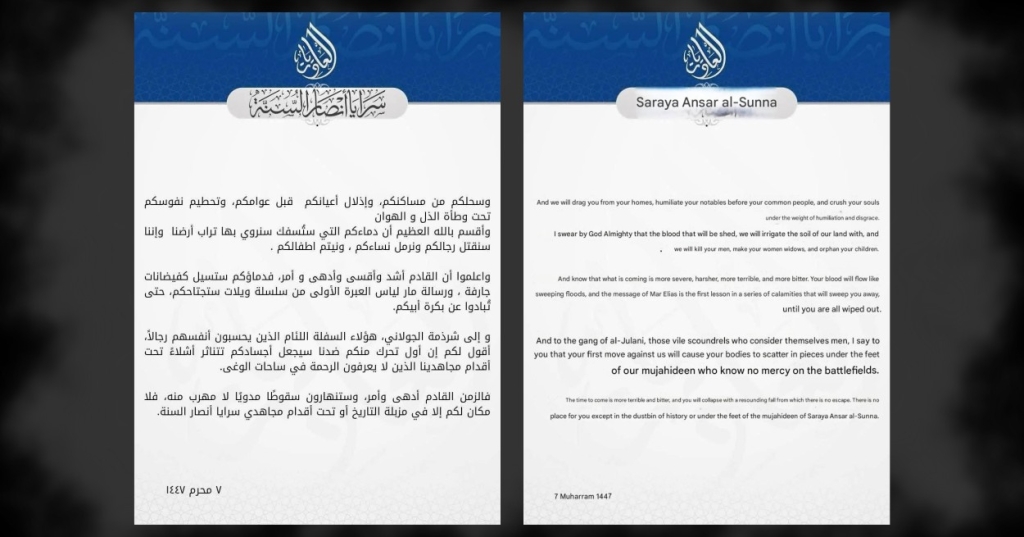Saraya Ansar al‑Sunna issues dire threats to Syria’s Christians
DARAMSUQ — A little‑known extremist faction named Saraya Ansar al‑Sunna has dramatically raised the stakes for Syria’s embattled Christian minority. In a chilling online communiqué following the deadly suicide attack targeting the Greek (Rûm) Orthodox Church of Mar Elias in Daramsuq (Damascus), the group vowed:
“What’s coming is worse. We will kill your men, widow your women, and orphan your children.”
This statement, delivered via the group’s Telegram channel, underscores a harrowing shift in violence targeting religious minorities in post‑Assad Syria.
On 21 June, during Sunday evening worship at the Church of Mar Elias, a terrorist with an automatic rifle and suicide vest entered the packed sanctuary — estimated at nearly 350 attendees — and detonated his vest after an initial burst of gunfire. The explosion resulted in the martyrdom of 29 people and left over 60 others injured. It was the deadliest attack on Christians in Daramsuq in decades.
Syrian authorities swiftly blamed the Islamic State (ISIS), citing alleged links to a sleeper cell based in Al-Hol Camp. But Saraya Ansar al-Sunna, a Salafi-Jihadist group formed earlier this year from defectors from Hayat Tahrir al‑Sham (HTS), stepped forward days later to claim responsibility, naming the bomber, Mohammed Zain al‑Abidin, and framing the attack as punishment for supposed “provocation” by the congregation.
Saraya Ansar al‑Sunna, which surfaced in February 2025, has since claimed responsibility for multiple sectarian attacks — targeting Alawites, Druze, and Shia Muslims — as part of a violent campaign to impose extremist Salafi doctrine across Syria. Experts suggest it may function either as an ISIS affiliate or a militant splinter that broke from HTS when it perceived that HTS had softened on enforcing Sharia.
The group’s threats to Christians — coupled with its expanding presence — signal a disturbing escalation. Syrian security forces, pressured by international scrutiny, have arrested several suspects, though their precise organizational links remain murky.
The psychological toll on Syria’s dwindling Christian population has been devastating. The sanctuary long provided by the church to the Christian and non-Christian alike has been marred, shattered pews and icons smeared with blood remain sobering reminders of looming danger. Greek (Rûm) Orthodox Patriarch Mar John X Yazigi denounced the bombing as an assault on coexistence and directly challenged Syrian President Ahmed al‑Sharaa’s ability to prevent sectarian violence.
Read Also: Foreign Fighters and Citizenship: Syria’s Post-Assad Dilemma
Families who have called the capital home for generations, jubilant with hope for the future following the fall of the Assad-regime, once again find themselves living in fear. A small Christian bookstore near Mar Elias reportedly shuttered immediately after the attack. Even children narrowly escaped the blast zone. Local civil defense teams responded swiftly, yet the community remains on edge.
From its base in Western Syria — and reportedly abroad in Lebanon — the group has warned of further assaults on Christians and other minorities, asserting that jihad has no borders. Analysts suggest the state’s reliance on former rebel factions, some still tolerant of extremist elements, has undermined its capacity to shield vulnerable communities.
As Reuters and other outlets have documented, the same foreign-linked militants implicated in recent coastal massacres — where non-Arab-speaking fighters were active—point to a growing influence of transnational jihadist cells within Syria’s military apparatus.
For Syria’s Christian community, this moment demands clarity on several fronts:
Will the government fully dismantle extremist factions?
Can it safeguard places of worship?
Will it fulfill its constitutional commitment to religious freedom?
With international bodies like the UN and European Union monitoring closely, President al‑Sharaa’s mandate is precarious. Protecting Syria’s shrinking mosaic of religious and ethnic minorities is not only a moral duty — it’s a litmus test for any government aspiring to rebuild order and justice.



















